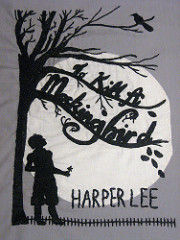Thank You, Harper Lee
- Feb 20, 2016
- 3 min read
Whether or not To Kill a Mockingbird ranks on your list of favorite novels, there's no denying the impact Harper Lee's popular, and many times controversial, book left on readers young and old. I remember gulping it down as a young student, excited to write my report and explain my take on Boo Radley and Tom Robinson's trial. (Yes, I was one of those students. That never changed.) The reality of the themes of racial injustice and loss of innocence didn't hit me so hard then because I, too, was still innocent in many ways, having read it in 6th grade, but the impact was still strong on my developing mind. Perhaps that's why PBS calls it one of the "most challenged and banned classical books," a statement that is not surprising, but I wish it were.

Looking back on it now, though I guess I can understand the (misplaced, in my opinion) sensitivity regarding the content and language, I can't imagine why someone would desire to ban a book that to myself, and I'm sure so many others, helped solidify a love for literature and really helped me begin to open my eyes to the reality of the world. I remember the sadness and outrage I felt at Tom's fate and the sympathy I felt for Boo. I remember loving Scout's independence and admiring Mrs. Dubose's strength before she died. When I said previously that the theme of racial injustice didn't hit me then, it's only a statement that I didn't so much realize that it was still relevant at the time of my reading it, and of course still is; there was never any doubt of the horror of Tom's plight, all because of the color of his skin. I also didn't comprehend the real implications of a rape allegation at that age; it was very wrong, of course, but it was hard to imagine what that really meant pre-puberty. Does that mean I didn't get anything of value from reading it then? Absolutely not. As Ilan Mochari wrote yesterday, it was a masterful lesson in empathy.
Scout's loss of innocence more than just that of her own; young readers lose some of theirs, too, as they learn the same lessons throughout the novel. As many books as I read growing up, and I always had a book in my hand, this is one that has always left a mark. Frankenstein, Of Mice and Men, A Raisin in the Sun, and Night are just some of the many works I loved in school, but the memory of To Kill a Mockingbird is the clearest because it was the first to deeply influence me. It was the first book I remember that really pushed me to think outside of the literary bubble and apply its lessons and themes to the world around me, even if the depth of that had to grow as I aged. Readers within a reasonable age range should get to go on that same journey with Scout, and hopefully one day this will no longer be in question.
Today, I value To Kill a Mockingbird even more than back then with my understanding all of the underlying themes and truths, from race and class to gender roles and injustice. There's a reason this is a classic and controversial, but isn't that the norm with all the best works? Those controversial elements are what make it the powerful piece it is and cement it in the minds and hearts of readers of all ages. With the news of Harper Lee's passing, there's no doubt that it will once again get much attention and that many readers, such as myself, will pick it up once again to revisit Scout's coming of age story, remembering the role Lee's novel played in their own journey to adulthood.
So, thank you, Harper Lee, for your enduring contribution to American literature and the powerful influence your work had on readers young and old, on people like me.












Comments